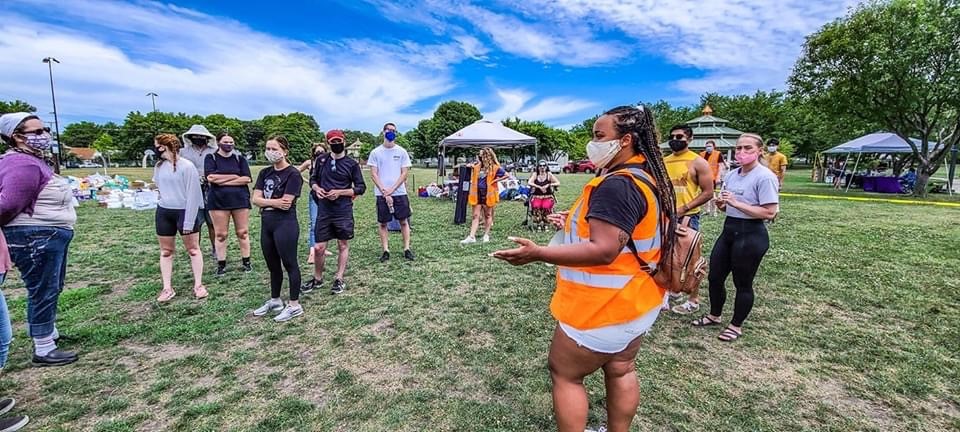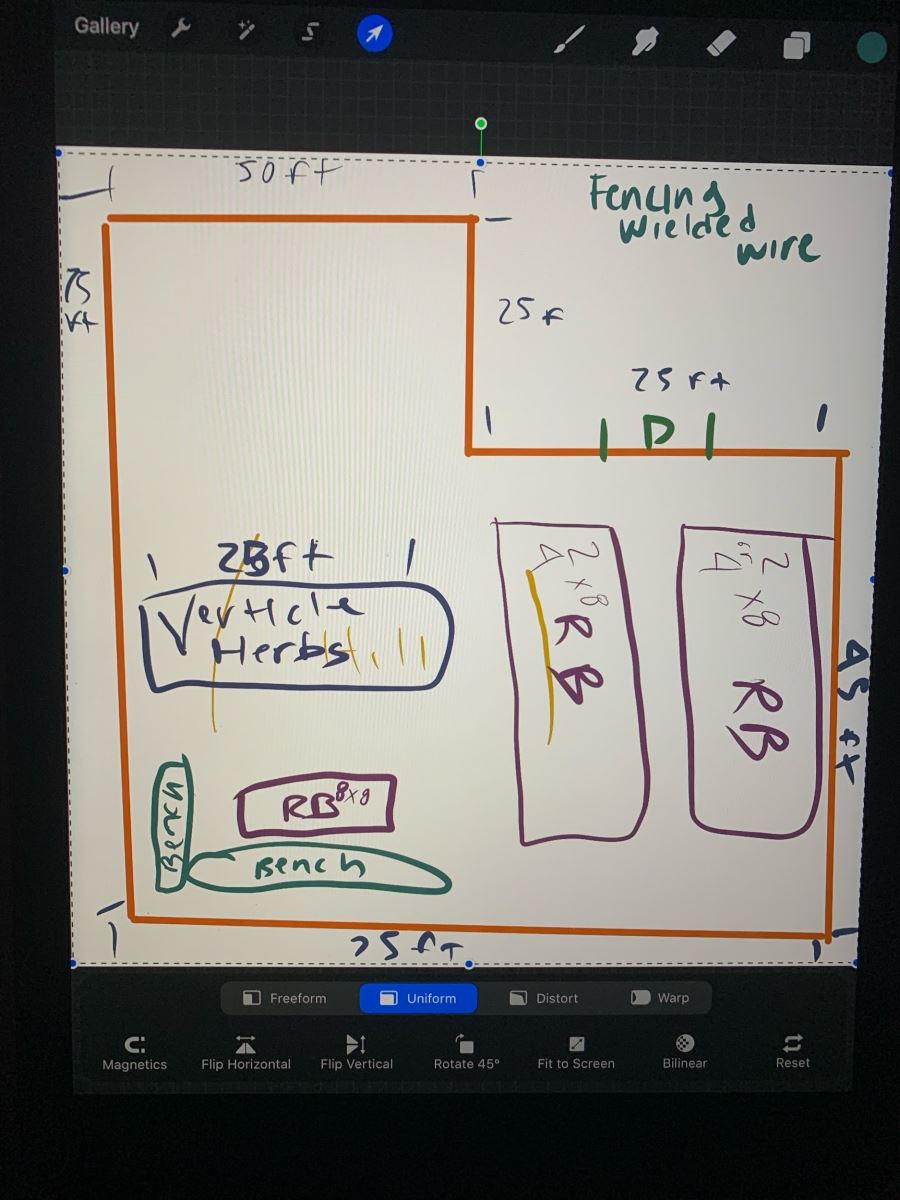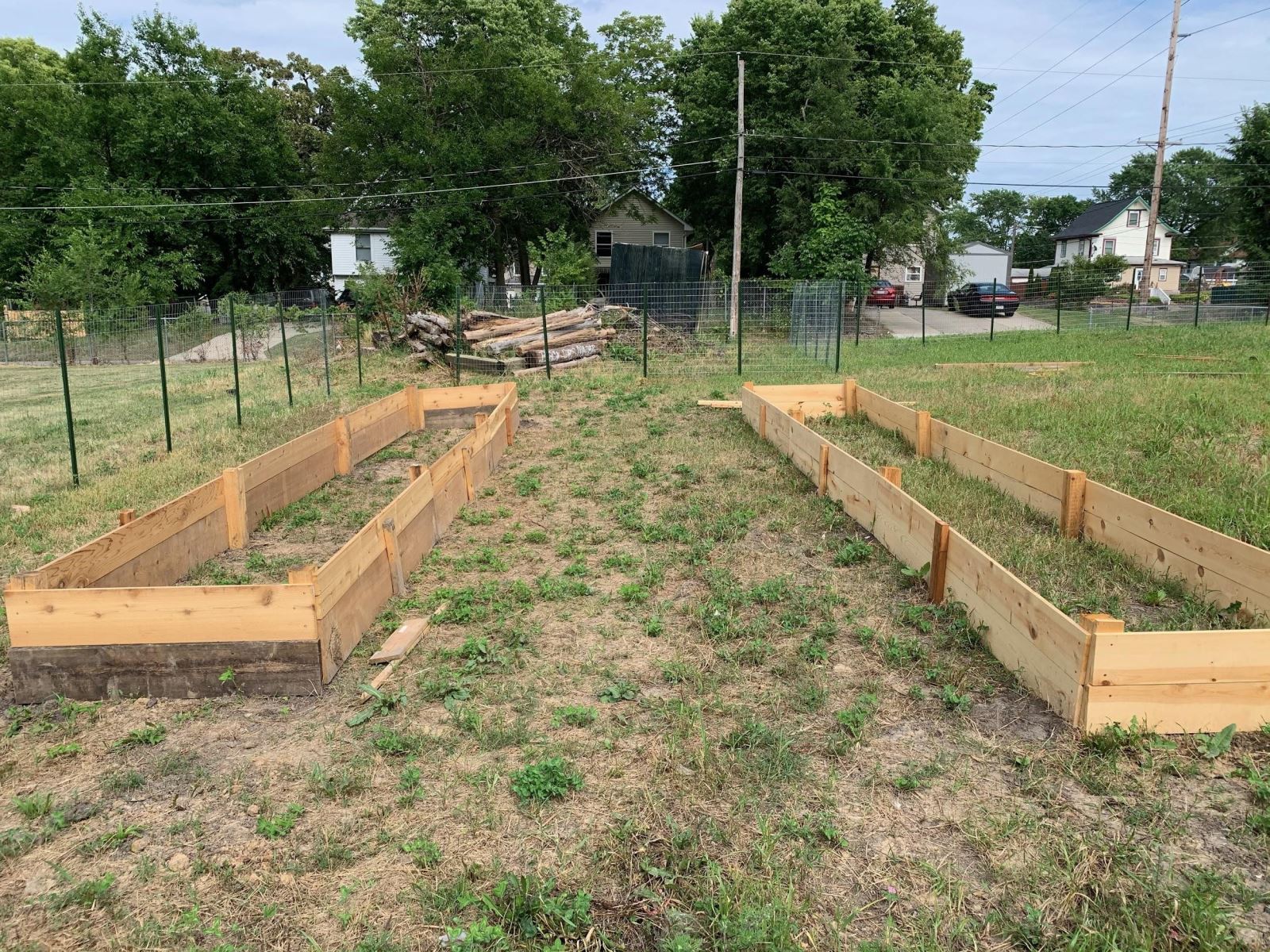Tackling Food Insecurity One Community Garden at a Time
posted
on Monday, November 9, 2020
in
Water and Land News
by Olivia Hicks, IEC Communications Intern
Photos provided by The Supply Hive and are reprinted with permission.
Sustainability is about more than organic food, green products, or renewable energy. It reaches further than just the environmental field: Sustainability means the resilience of a community and its ability to survive. That includes access to clean water, food, and other basic necessities.
Right here in Iowa, certain neighborhoods and communities lack basic resources. The Supply Hive, a non-profit organization connected to the Des Moines Black Lives Matter Movement, has taken aim at food accessibility in Des Moines by constructing two community gardens.

Zakariyah Hill leads volunteers at a The Supply Hive event
The first garden serves the neighborhood surrounding Edna Griffin Park, located on 13th and College streets. The second garden, located near the Des Moines River on Michigan Street, is about two acres and will cater to a number of neighborhoods. The space is leased by Sweet Tooth Farm, but the project is led by Zakariyah Hill, the founder of the Supply Hive. “We’ve always wanted to start a community garden,” said Hill. “We want to use it as a place to teach and distribute free produce, as well as continue to exercise healthy habits.”
 When Hill spoke with IEC earlier this summer, the non-profit organization was still in the planning and design process, but fencing and raised garden beds had been installed. An herb garden and seating areas are planned next. The planting plan is slightly different for the Michigan Street location, where the clay-like soil must be rejuvenated with nutrients from cover crops before produce can be planted.
When Hill spoke with IEC earlier this summer, the non-profit organization was still in the planning and design process, but fencing and raised garden beds had been installed. An herb garden and seating areas are planned next. The planting plan is slightly different for the Michigan Street location, where the clay-like soil must be rejuvenated with nutrients from cover crops before produce can be planted.
The tentative plans for distribution of food include a lending-library approach. Produce pick-up, delivery boxes, and even pre-cooked meals using vegetables and fruit grown in the garden are a few possibilities. However, the community aid does not end there - the Supply Hive also plans to donate clothing, hygiene products, and books.
This community aid will help combat what Hill deems a food desert north of downtown Des Moines. Lacking a grocery store stocking fresh produce for miles, residents face a disadvantage. The closest small grocery store include C Fresh Market (almost one mile from Edna Griffin Park), Tawakal Groceries (1.1 miles), and Hilal Groceries (1.4 miles). Larger grocery stores are farther – the closest Hy-Vee is nearly two miles from the park while the closest Price Chopper is three miles away.
The problem of food insecurity is only exacerbated by the threat of COVID-19. Hill pointed out the challenges of accessibility when residents must use public transportation or are confined to their homes during the pandemic.
While there are other food security efforts in Des Moines, Hill believes the two community gardens will outshine the rest by adapting to residents' needs. "They [other gardens] are kind of standard, they don't connect with the individual person. It's like, here you go: Everything's the same, they treat everybody the same. But people have different needs," said Hill. "That's why we're here, to listen to people's needs and to hear them out in a space that isn't necessarily just about giving and getting food, but about connecting with others."

Hill at the Michigan Street location
Hill shared the groups’ future plans to restore prairie land surrounding the Michigan Street garden. The prairie will serve as an eco-tourist spot for Des Moines residents, including those who aren’t able to drive to Doolittle Prairie State Preserve or Turin Prairie, but it will also celebrate Iowa's indigenous roots. "There's a lot of history and culture that lies within prairies, with indigenous folks and Black folks who founded Iowa and who lived in Iowa centuries ago. So we're trying to also pay homage to that," said Hill.
In addition to providing a beautiful natural landscape for residents to enjoy, the prairie could provide a multitude of water quality and flood prevention benefits to Des Moines. "A perennial prairie buffer along a waterway provides many benefits. Not only does it create habitat for pollinators and other wildlife, it improves water quality and mitigates flooding. Adding a conservation practice adjacent to the garden enhances the environmental services of the project," said Alicia Vasto, the Water Policy and Advocacy Specialist for the Iowa Environmental Council. “This focus on the environmental health and equity of neighborhoods in Des Moines is long overdue.”
The garden and possible prairie restoration projects serve as an example of the connection between environmental health and racial justice. For Hill, the two are interconnected. Not only does a community garden provide environmental benefits, but it also provides food, environmental education, and a community space for disenfranchised neighborhoods.
“When you look at food deserts, they are in low-income neighborhoods. When you look at those living in low-income neighborhoods, you find a majority of black and brown folks and their families,” said Hill. “That’s the system working against black and brown folks. They don’t have access to food. They don’t have access to proper education.”

The start of the garden beds at Edna Griffin Park
While the gardens will have a positive environmental impact, the Supply Hive’s main focus is equity and racial justice. Overall, the non-profit functions as a support system for Des Moines Black Lives Matter protesters by supplying food, water, and protective gear. Other Supply Hive community events include supply drives for Black mothers, school supplies, clothing, and canned goods.
"Our mission is to provide a space of nourishment through extraordinary times in order to build the next leaders," their mission statement says.
However, creating future leaders requires resilience. The community gardens exist as a statement of the movement's longevity. "I can definitely say we are built around sustainability. Within ourselves, the Earth, and the movement. So whatever we do, we want to keep this force that we've created and birthed out of the process: this force of unity in mutual aid and spread it here in Des Moines and through Iowa," said Hill. "It's important that there is something here to stay."
The Supply Hive is always in need of volunteers, specifically those with green thumbs. If you are interested in volunteering at the community gardens and/or becoming a committed weekly volunteer, you can reach Zakariyah Hill at thesupplyhive@gmail.com or visit the organization's social media for upcoming events and volunteer days: @thesupplyhive on Instagram, Facebook, and Twitter.
- environmental justice
- public health
- resiliency